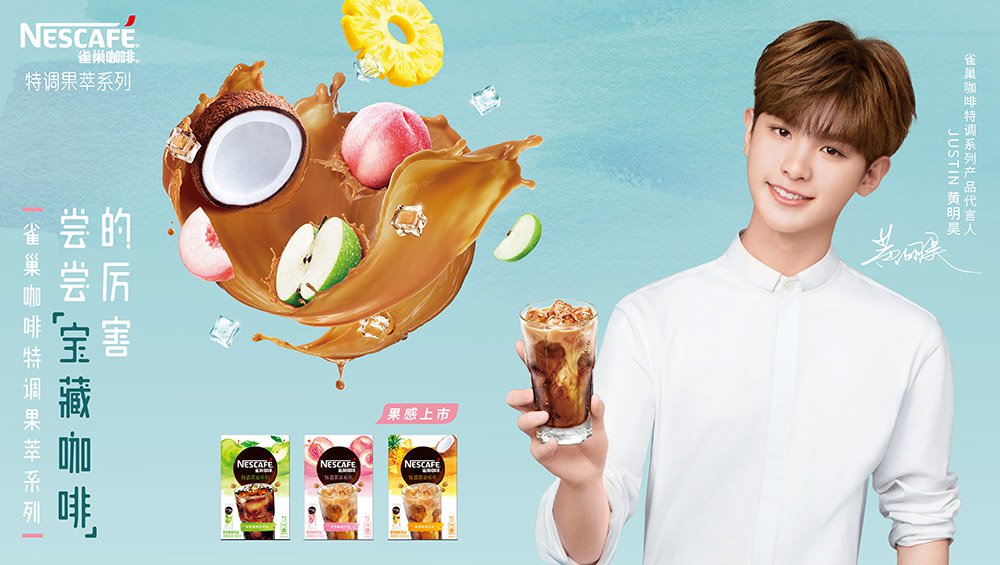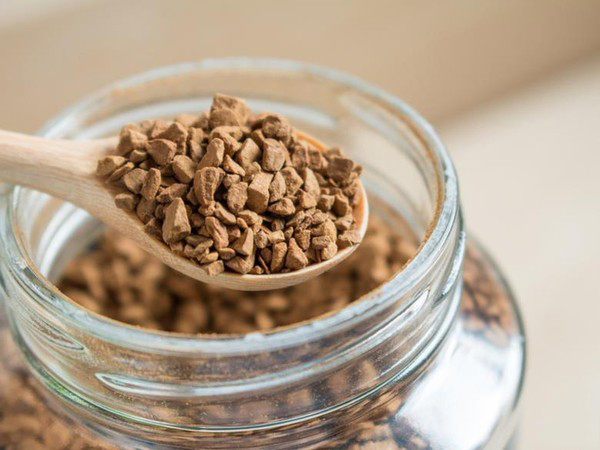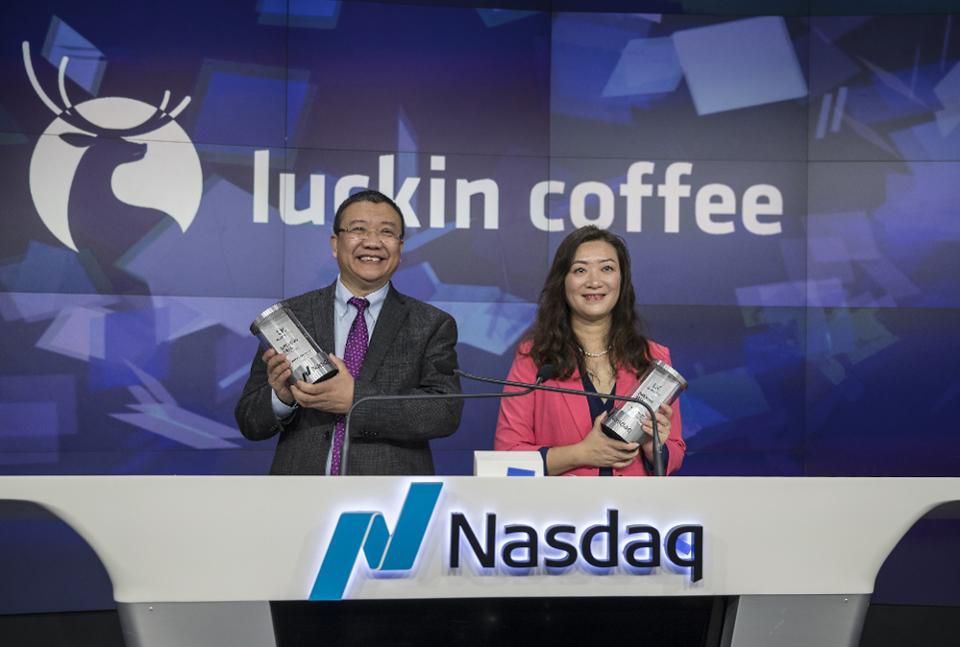Nestle launched a new fruit-flavored product [Fruit extract Coffee]! Instant coffee still has a chance to explode?!
Professional coffee knowledge exchange more coffee bean information please follow the coffee workshop (Wechat official account cafe_style)
Recently, during Tmall Coffee Day, Nestle Coffee announced a number of cross-border products of "fruit + coffee"-fruit extract coffee, which is also the first innovative fruit coffee product launched by Nestle Coffee. It is understood that Fruit extract Coffee is an innovative coffee product independently developed by Nestl é China, specially designed for young consumers. This is the localized innovation of Nestl é in the Chinese market, and its co-developer is Tmall Innovation Center.
Different from the traditional instant coffee products, the new product "Fruit extract Coffee" launched by Nestle Coffee mainly highlights the cross-border combination mode of "fruit + coffee". It also includes three new flavors: peach flavor, coconut pineapple flavor and green apple flavor.

Picture from: Nestle
In addition to the very different packaging styles, this new fruit extract series of instant coffee is also different from the traditional instant coffee "must be mixed with hot water" in drinking style. According to the official introduction of Nestle Coffee, the taste of green apple can be adjusted directly with ice water or sparkling water, while peach flavor and coconut flavor pineapple flavor can not be directly mixed with ice water, but can be mixed with ice after a small amount of hot water. The official explanation is that they have joined Nestle's coffee companion and have different solubility.
According to the previous market research data released by Nestl é, the annual sales of multi-flavor coffee products on the e-commerce platform grew rapidly in 2018, with an increase of nearly 70%, while young Chinese consumers are most fond of trying fresh and unique flavors. Young consumers' perception of the coffee category is that drinking coffee is a cool thing, but compared to the refreshing effect of coffee, young consumers are more likely to identify with the drink label of coffee, so they have a variety of requirements for taste.
The trend of mixing fruit and coffee has been quite popular in the coffee catering industry, which is also the trend of new product development in the coffee industry in recent years. For example, Starbucks and Costa Coffee launched new "fruit + coffee" drinks this year. Industry insiders said that the research and development of Nestl é fruit-flavored coffee, to a certain extent, reflects the counter-attack of instant coffee against coffee products such as freshly ground coffee, and matches accurately with young consumers.

Picture from: Nestle
At the same time, Nestle Coffee has also chosen a younger marketing method for Fruit Coffee, choosing Huang Minghao, a popular star among young people, as the image spokesman of Fruit Coffee.
GE Wen, senior vice president of coffee business in Nestl é Greater China, said: "China is a potential market for coffee consumption. In order to cope with the rapid development of the Chinese market, brands must constantly change and innovate in order to win more consumer preferences." Young consumers like fresh tastes and consumer experiences, so this special series of coffee aims to match coffee with the most fashionable taste elements of the season to create a rich and wonderful multiple taste experience. "
Is there still a chance for instant coffee to break out?
Instant coffee has always been an important product line of Nestl é in the Chinese market. What is the development potential of China's coffee market? The Nestl é coffee business department has had a long insight into the market and consumers. According to their observation, the average annual consumption of coffee in China is only 6 cups per capita, while in Europe and the United States, and even in neighboring Japan, the annual per capita consumption of coffee can reach more than 300 cups. "this is the statistics of all categories, including instant, instant drinks, brick-and-mortar stores, and there is no doubt about the size of the coffee market." Li Ting, director of coffee business marketing in Nestle Dazhong, introduced.

Since Ruixing targeted Starbucks, the fierce battle of brick-and-mortar coffee shops has begun, which has not only raised the attention of the overall category of coffee, but also led to the rapid growth of China's coffee consumption market. And instant coffee, which is familiar to Chinese consumers earlier, is also aware of the potential of industry growth and intensified competition in the industry, trying to further share the market dividend through the innovation of the instant coffee business that it is good at.
In fact, all coffee categories in the Chinese market are growing, including instant coffee, of course. There is also an indisputable fact that per capita coffee consumption in China is only 6 cups per year, of which 84% is instant coffee. Although Starbucks and other coffee chains have begun to focus on third-and fourth-tier cities in recent years, with the per capita income and consumption level of third-and fourth-tier cities, how many people can afford a cup of freshly ground coffee worth 30 or 40 yuan for a long time? How to express the coffee needs of "young people in small towns"?
It has to be said that Nestl é's fruit extract series takes a fancy to the market demand of this subdivided group. The price of fruit extract series instant coffee is 20 yuan per box, and the average price of each instant coffee (15 grams) is only 2.5 yuan. If the e-commerce platform carries out promotional activities, the actual price is even lower. Compared with the "expensive" chain of freshly ground coffee, instant coffee is more likely to impress young, price-sensitive groups.
And unlike the European and American markets, most of the coffee culture in the Chinese market pursues the functionality of coffee, considering that it can be refreshing, and regard coffee as the same drink as milk tea and fruit juice. Nestl é Coffee values the cities below the third tier where the war between brick-and-mortar coffee shops can not spread, which is the main battlefield of Nestl é instant coffee and can be different from physical coffee shops.
If in the future, instant coffee can continue to maintain product innovation and meet the needs of more segments of groups, the Chinese instant coffee market may still have a chance to break out.
END
Important Notice :
前街咖啡 FrontStreet Coffee has moved to new addredd:
FrontStreet Coffee Address: 315,Donghua East Road,GuangZhou
Tel:020 38364473
- Prev

Little blue cups are cursed? Ruixing Coffee, which soared 50% on its first day of listing, fell below its issue price!
Professional coffee knowledge exchange More coffee bean information Please pay attention to coffee workshop (Weixin Official Accounts cafe_style) listed less than a week Ruixing coffee, Beijing time 22 evening fell below the issue price. According to 21st Century Business Herald 21 Financial Client, shares of Ruixing Coffee (NASDAQ: LK) listed in NASDAQ were reported at $16.61 per share, down 4.1% on the day, falling below its hair.
- Next

Why did Luckin Coffee, whose share price is falling, choose to be listed in the United States? What can we learn?
Professional coffee knowledge exchange more coffee bean information please follow the coffee workshop (Wechat official account cafe_style) Lucky caffeine in the Chinese market through rapid display stores and fission subsidies and other means to quickly gain a certain share of the coffee market. On the evening of May 17, Luckin Coffee officially listed on Nasdaq under the ticker LK, making it the largest start-up company.
Related
- What brand of black coffee is the most authentic and delicious? what are the characteristics of the flavor of the authentic Rose Summer Black Coffee?
- Introduction to the principle and characteristics of the correct use of mocha pot A detailed course of mocha pot brewing coffee is described in five steps.
- Which is better, decaf or regular coffee? how is decaf made?
- How much is a bag of four cat coffee?
- How about four Cat Coffee or Nestle Coffee? why is it a cheap scam?
- Which is better, Yunnan four Cats Coffee or Nestle Coffee? How about cat coffee? is it a fake scam? why is it so cheap?
- How about Cat Coffee? what grade is a hoax? which instant coffee tastes better, four Cat Coffee, Nestle Coffee or G7 coffee?
- Process flow chart of coffee making-Starbucks coffee making process what coffee tastes good at Starbucks
- The top ten best coffee beans in the world Rose summer coffee or Tanzanian coffee tastes good
- Yunnan four cat coffee is good to drink?_four cat coffee is a big brand? four cat blue mountain coffee is fake?

